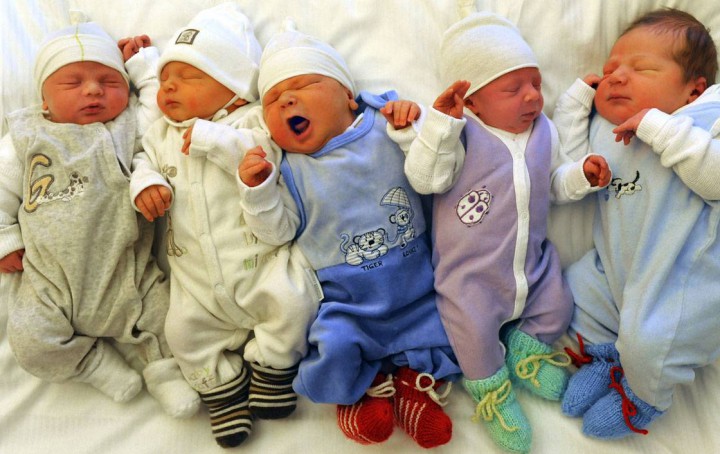TORONTO – Expectant mommies using pregnancy as a ticket to eat for two may be reluctant to do so now after a new study suggests that giving in to junk food binges could be hurting their quickly developing babies.

Australian researchers say that pregnant moms who feast on meals packed with fat, salt and sugar are creating unhealthy habits in their unborn babies.
These babies are born with an innate craving for junk food and are desensitized to the chemical reactions of fat, sugar and salt so they’ll eat more to reap the “feel good” response, the University of Adelaide report suggests.
That might be enough for expectant moms to ignore those pregnancy cravings. Global News looks at the study findings and the verdict from Canadian experts.
The study’s findings:
In the study, Australian researchers studied two groups of rat pups – one group was fed normal rat food while the other group dined on a range of human junk food during the pregnancy and lactation stages.
After the babies were weaned off their mother’s milk, they were given daily injections of an opioid receptor blocker, which blocks opioid signaling. Our bodies release these addictive chemicals after eating foods that are high in fat and sugar, but blocking the opioid signaling would stop this release.
Turns out, the pups feeding off of their mom’s junk food diet weren’t as responsive to the injection, so their brain signalling to release dopamine wasn’t as sensitive. The researchers suggest that these pups born with a weaker opioid reaction could need to eat more junk food to reach that feel-good chemical response.
Ultimately, moms’ eating habits while their babies are forming could help determine how babies taste and how sensitive they are to certain ingredients, the researchers conclude.
Sound bite: “This study shows that addition to junk food is true addiction,” Dr. Gerald Weissman, editor in chief of the FASEB journal, said in a statement. “Junk food engages the same body chemistry as opium, morphine and heroin. Sad to say, junk food during pregnancy turns the kids into junk food junkies.”

Get weekly health news
Canadian experts weigh in:
Canadian doctors agreed with the study, suggesting that it adds to a library of research linking maternal eating habits to babies’ health outcomes.
“It makes perfect sense. The evidence is mounting,” said Dr. Michelle Mottola, director of the Exercise and Pregnancy Lab at the University of Western in London, Ont.
“What a mother does during pregnancy has a huge impact on her offspring later in life.”
She said that an expectant mom’s diet determines what her baby uses to develop in the womb. If it’s more sugar, the baby responds by secreting more insulin, which promotes growth. In turn, studies have shown that moms on sugar-laden diets have plumper babies.
“The baby can be born at risk for diabetes later in life because of what the baby was being fed from the mother,” Mottola explained.
Dr. Rena Mendelson, a nutrition professor at Ryerson University with more than 40 years of experience in the field, says that the medical community used to believe that the placenta would filter out any unnecessary nutrients. Now they know that’s not the case.
“Anything that goes into the mother’s diet – even before pregnancy – can influence fetal development. It’s released into body fat, ends up in the blood stream and that travels through the placenta and into the fetus,” Mendelson said.
What a mother eats is so intertwined to her baby’s health that it’s been linked to her baby’s likelihood of dealing with chronic disease – obesity, hypertension, metabolic syndrome and diabetes, to name a few conditions moms could be leaving their babies predisposed to when they grow up.
What babies dine on while in the womb also sets the tone for what they’ll crave once they’re born.
“We know that diet during pregnancy is very influential in terms of development for flavor preferences, for sweet, fat, salt,” Mendelson told Global News.
Other studies mirroring feeding pregnant mice different diets showed that babies that developed in the womb on cafeteria diets were more likely to prefer high fat and sugar intakes than those fed standard fare.
What women should be eating while expecting
With these findings in mind, women shouldn’t accept a conventional notion that pregnancy equates to letting go, and eating what they want and as much as they want for several months, the experts warn.
“There is risk that women use pregnancy to eat foods that are just calories, knowing that they are gaining weight. But in reality, during pregnancy, you’re not really eating for two,” Mendelson said.
A tiny fetus doesn’t need more than an extra apple and a yogurt in a day, for example, Mottola told Global News. And that’s only in the second and third stages of pregnancy.
Moms should still adhere to watching their intake of processed foods and empty calories. Mottola says these healthy eating habits should be established even before pregnancy.
Women with normal weight should be putting on around 25 to 35 pounds in pregnancy. These days, some women gain nearly 60 pounds. That could put them at risk of obesity and diabetes.
“What many women are thinking is that they can put up their feet and rest and I think that’s one of the worst things they can do,” Mottola said.
Read Health Canada’s guidelines on pregnancy weight gain here.
And watch UWO’s Make A Difference video shedding light on preventing childhood obesity as early as during pregnancy here:
carmen.chai@globalnews.ca







Comments